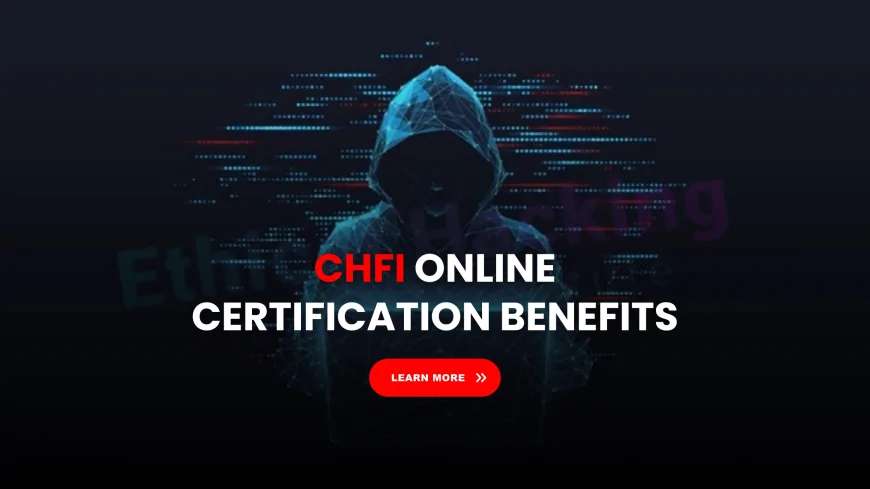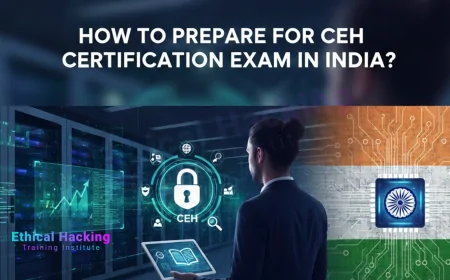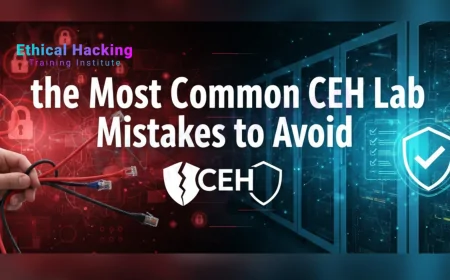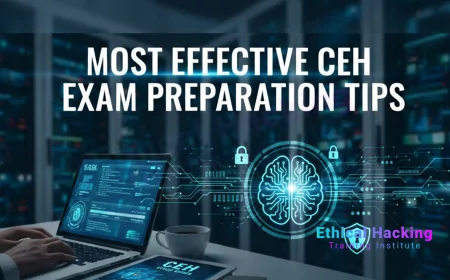Learn CHFI Online: The Benefits of Online Training for Cybersecurity Professionals | Why Online CHFI Certification Works for Cybersecurity Professionals
Discover the benefits of learning CHFI online. This complete guide explores flexible training options, virtual labs, platform comparisons, and cost savings for cybersecurity professionals preparing for the CHFI certification.

Table of Contents
- Introduction
- What Is CHFI?
- Growth of Online Learning in Cybersecurity
- Top Advantages of Learning CHFI Online
- 1. Flexibility & Self-Paced Learning
- 2. Global Access to Quality Resources
- 3. Interactive Virtual Labs
- 4. Cost-Effective Compared to Classroom
- 5. Live Sessions & Expert Instructors
- 6. Peer Networks & Collaborative Learning
- 7. Always Updated Curriculum
- 8. Learning Tools & Integration
- Top Online CHFI Training Platforms
- How to Choose the Right Platform
- Tips to Maximize Online CHFI Training
- Common Online Training Challenges & Solutions
- Career Impacts & Employer Perception
- Credential Validity & Recognition
- Cost Breakdown of Online vs Offline
- Studying Without Disrupting Your Job
- FAQs
- Conclusion
Introduction
Online education has revolutionized professional training—especially in cybersecurity. The Certified Hacking Forensic Investigator (CHFI) certification prepares candidates to investigate cybercrimes and is ideal for digital forensics roles. This guide explains why learning CHFI online benefits cybersecurity professionals, emphasizing flexibility, lab access, cost efficiency, and market value.
What Is CHFI?
CHFI is a globally recognized certification from EC-Council that confirms proficiency in digital forensic investigations. Covering disk, network, malware, mobile, email, cloud forensics, data acquisition, anti-forensics techniques, and legal compliance, it verifies the ability to gather investigative evidence and support legal proceedings.
Growth of Online Learning in Cybersecurity
The online learning landscape has surged—offering access to certified instructors, virtual labs, study groups, and self-paced lectures. Especially post-pandemic, CHFI and other cybersecurity courses have become more easily accessible, fitting into timelines and budgets while maintaining quality.Top Advantages of Learning CHFI Online
1. Flexibility & Self-Paced Learning
Learners control their schedule, ideal for working professionals. Whether enrolling for live sessions or self-paced modules, you can learn evenings or weekends, syncing training with work and personal commitments.
2. Global Access to Quality Resources
Online training removes regional barriers. Access official EC-Council accredited trainers from providers like Simplilearn, Infosec Institute, Koenig, and Cybrary regardless of location.
3. Interactive Virtual Labs
Online CHFI includes iLabs or platform-hosted virtual environments to simulate forensic cases—ensuring safe and structured environments for practical tool use.
4. Cost-Effective Compared to Classroom
Online formats usually cost less than physical classes. You save on travel, lodging, and printed materials—all while accessing rich media, labs, and exam vouchers.
5. Live Sessions & Expert Instructors
Courses typically provide access to expert-led Q&A sessions for deeper insights. Most trainers are experienced digital forensic examiners or former law enforcement professionals.
6. Peer Networks & Collaborative Learning
Virtual classes create channels for discussion, group labs, and role-play. Forums and study groups—on platforms like Discord, Reddit, and Cohort forums—enhance learning.
7. Always Updated Curriculum
Online content enables rapid updates—ensuring topics like cloud forensics, anti-forensics, IoT investigations, and cybercrime laws stay current.
8. Learning Tools & Integration
Online platforms integrate study tools like flashcards, progress tracking, practice quizzes, and automatic correction—helping reinforce knowledge.
Top Online CHFI Training Platforms
| Platform | Features |
|---|---|
| EC-Council iClass | Official accredited training with instructor guidance & labs. |
| Simplilearn | Live bootcamps, iLabs, and job assistance. |
| Infosec Institute | On-demand CHFI bootcamps, simulated labs, mentorship. |
| Koenig Solutions | Live online training, multilingual support. |
| Cybrary | Self-paced videos, lab environments, and community support. |
| Pluralsight | Video-based learning plus challenge labs (with subscription). |
How to Choose the Right Platform
-
Accreditation: Authorized EC-Council partners guarantee curriculum and exam voucher compliance
-
Lab Quality: Practice essentials like Autopsy, Wireshark, FTK, Cellebrite.
-
Instructor Experience: Professionals with real-world forensic backgrounds.
-
Learning Format: Match self-paced or live based on your schedule.
-
Support & Community: Look for discussion boards or mentorship.
Tips to Maximize Online CHFI Training
-
Set a consistent schedule and define weekly milestones.
-
Use personal VMs (VirtualBox/VMware) for labs.
-
Attend live sessions and ask questions actively.
-
Join study groups for accountability.
-
Use flashcards and quizzes to reinforce memory.
-
Revisit case studies to apply theory practically.
Common Online Training Challenges & Solutions
| Challenge | Solution |
|---|---|
| Time management | Use calendars, treat sessions as fixed commitments. |
| Lack of motivation | Join peer study groups. |
| Technical limitations | Ensure consistent internet and system capacity for virtual labs. |
| Limited feedback | Ask trainers for one-on-one calls or seek mentorship. |
| Isolation during study | Connect via forums, participate in cohorts, attend virtual meetups. |
Career Impacts & Employer Perception
CHFI online training is highly regarded, with employers focusing on skills and accreditation over format. Graduates secure roles such as Digital Forensics Analyst, SOC Engineer, Incident Responder, and Cyber Investigator—often with salary boosts of 25–40% post-certification.
Credential Validity & Recognition
CHFI is ANSI-accredited and EC-Council-approved globally. Professionals trained online receive the same certification as those who attend in-person courses.The certification is valid for 3 years and renewable via continuing education.
Cost Breakdown of Online vs Offline
| Format | Self-Paced Price | Instructor-Led Price | Notes |
|---|---|---|---|
| Online | $700 – $1,200 | $1,200 – $2,000 | Includes labs, ebooks, and vouchers |
| In-Person | $1,500 – $3,000 | $2,000 – $4,000 | Includes room, instructor travel, printed materials |
Online learning typically saves 30–50% overall.
Studying Without Disrupting Your Job
Evening or weekend sessions make it easy to balance current roles. Virtual labs can run overnight or during low-traffic hours. Some platforms let you pause and resume modules seamlessly.
FAQs
1. What is CHFI and why is it important?
CHFI (Certified Hacking Forensic Investigator) validates your skills in digital forensics and cybercrime investigation—essential in today’s threat landscape.
2. Can I get CHFI certification fully online?
Yes. Training, labs, and the CHFI exam can all be taken online through EC‑Council authorized platforms and Pearson VUE proctoring.
3. Is online CHFI training as valid as classroom?
Absolutely. The certificate has the same recognition and exam rigor, regardless of training mode.
4. How long does online CHFI training take?
Self-paced courses typically take 4–6 weeks; instructor-led bootcamps can complete in 2–4 weeks.
5. Are virtual labs effective?
Yes—virtual labs simulate real forensic scenarios and let you practice tools safely and dynamically.
6. Which tools are covered?
Common tools include Autopsy, FTK, EnCase, Wireshark, Volatility, and Cellebrite.
7. How much does online CHFI training cost?
Ranges from $700 (self-paced) to $2,000 (live instructor), including labs and vouchers.
8. Can I pay in installments?
Yes—platforms like Simplilearn and Koenig offer monthly EMI payment plans.
9. What prerequisites do I need?
Basic networking, OS knowledge, and exposure to IT concepts are helpful.
10. Can I balance training with a full-time job?
Yes—online training schedules are flexible and often split across weekends or evenings.
11. How do I stay motivated online?
Use peer study groups, schedule lessons, and track progress rigorously.
12. Is CHFI practical exam included?
Some packages include it; others provide it as an add-on. Virtual platforms deliver practical environments.
13. Can I retake the exam?
Yes, with a retake fee. Some platforms also include a free retake voucher.
14. Does online training include certification voucher?
Most accredited providers bundle voucher & labs into the package.
15. How do I prepare for the CHFI exam?
Combine theory, labs, practice tests, and community discussions for best results.
16. Are online communities helpful?
Yes—forums, Discord rooms, and study groups add accountability and shared insights.
17. Is there a live chat with instructors?
Yes—many platforms offer live Q&A and one-on-one mentorship.
18. What if I face technical issues during labs?
Supported platforms provide helpdesk support or troubleshooting guides.
19. Will employers accept online training?
Definitely—employers prioritize certification validity and skills, not delivery mode.
20. What comes after CHFI?
Advanced roles include GCFA, EDR analyst, SOC lead, and digital forensics consultant positions.
Conclusion
Online CHFI training offers incredible value: flexibility, cost savings, quality instruction, hands-on labs, and lifelong career benefits. Whether you're a busy professional or just prefer digital learning, online CHFI equips you to become a forensic investigator with top-tier skills and market-ready credentials.
What's Your Reaction?
 Like
0
Like
0
 Dislike
0
Dislike
0
 Love
0
Love
0
 Funny
0
Funny
0
 Angry
0
Angry
0
 Sad
0
Sad
0
 Wow
0
Wow
0

















